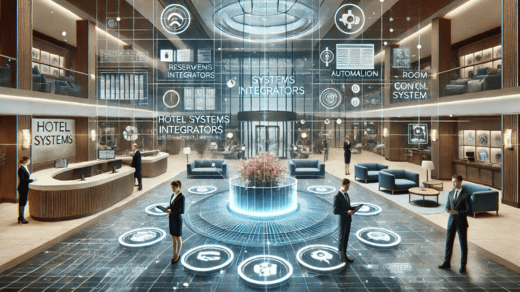How Hotel Systems Integrators and Property Management Systems Work in Hotels

The hospitality industry has undergone a technological transformation, with efficiency and guest satisfaction becoming more critical than ever. At the heart of this evolution are hotel systems integrators and property management systems (PMS), two technological pillars that streamline operations, elevate guest experiences, and boost profitability. Let’s explore how these systems work together to empower modern hotel businesses.
The Role of Hotel Systems Integrators
Hotel systems integrators specialize in creating a seamless operational ecosystem by connecting various technologies within a hotel. These integrations ensure that systems such as booking engines, point-of-sale (POS) systems, in-room entertainment, and energy management communicate effectively.
- Streamlined Operations: Integrators eliminate the need for repetitive manual processes by enabling systems to share data in real-time. For instance, when a guest books a room, their information is automatically synced with the PMS, housekeeping schedules, and billing systems. This synchronization minimizes human error and allows staff to focus on delivering exceptional service.
- Enhanced Guest Experience: Integrated systems allow hotels to offer a range of personalized and convenient services. From mobile check-ins and digital room keys to in-room controls for lighting and temperature, integrators ensure these features work seamlessly together. This creates a more enjoyable and tailored stay for guests.
- Cost Efficiency: By optimizing the use of existing technology and reducing redundancies, hotel systems integrators help reduce operational costs. Hotels can also extend the lifecycle of their systems, maximizing return on investment (ROI).
- Scalability and Future-Proofing: Integrators ensure that as hotels grow or adopt new technologies, these additions can be seamlessly integrated into the existing system. This flexibility allows hotels to stay competitive in a rapidly evolving industry.
The Role of Property Management Systems
Property Management Systems (PMS) serve as the backbone of hotel operations, centralizing critical functions such as reservations, front desk management, housekeeping coordination, and financial reporting. A well-implemented PMS is essential for the smooth functioning of any hotel.
- Reservation Management: PMS platforms integrate with online travel agencies (OTAs), metasearch engines, and direct booking channels. This integration ensures that all reservations are centralized in one place, reducing the risk of overbookings and improving room allocation.
- Guest Profiles and Personalization: PMS solutions store detailed guest profiles, including preferences, special requests, and past interactions. These profiles enable hotels to deliver personalized services, such as setting up a room according to a guest’s preferences before their arrival.
- Operational Efficiency: PMS platforms streamline daily operations by coordinating housekeeping schedules, maintenance requests, and room availability. Real-time updates ensure that staff can respond promptly to any changes or issues.
- Actionable Insights: PMS platforms generate reports on key performance indicators (KPIs) such as occupancy rates, average daily rate (ADR), and revenue per available room (RevPAR). These insights help hotel managers make data-driven decisions to optimize operations and marketing strategies.
The Power of Integration
The synergy between hotel systems integrators and PMS takes operational efficiency and guest satisfaction to the next level. By integrating PMS with other hotel systems—such as revenue management, customer relationship management (CRM), and energy controls—hotels can unlock new levels of performance and profitability.
- Personalized Guest Experiences: When PMS integrates with in-room technologies, hotels can provide automated services tailored to each guest. For instance, room settings such as temperature and lighting can be adjusted automatically based on the preferences stored in the guest’s profile.
- Real-Time Synchronization: Integrators ensure that updates in one system are reflected across all connected systems. For example, when a guest checks out, the PMS immediately updates housekeeping schedules and billing systems, ensuring a smooth transition for both staff and the next guest.
- Revenue Optimization: By combining PMS data with revenue management tools, hotels can dynamically adjust room rates based on demand, market trends, and historical data. This approach maximizes profitability while maintaining competitiveness.
- Enhanced Security: Integration ensures that sensitive guest data is protected across all systems. Advanced encryption and data-sharing protocols minimize the risk of breaches, giving guests peace of mind.
Real-World Applications
Consider a luxury hotel that has implemented both a PMS and a fully integrated system. Upon booking, the guest’s preferences—such as a high-floor room with ocean views—are stored in the PMS. Upon arrival, the guest can check in via their smartphone, access their room with a digital key, and find the room pre-set to their preferred lighting and temperature. During their stay, any purchases made at the hotel’s restaurant or spa are automatically added to their bill. Upon checkout, the guest receives a detailed invoice via email, while the housekeeping team is instantly notified to prepare the room for the next guest. This seamless experience is the result of effective system integration.
The Future of Hotel Technology
As technology continues to evolve, the integration between PMS and other systems will become even more sophisticated. Artificial intelligence (AI) and machine learning are poised to play a significant role, enabling predictive analytics and deeper personalization. For example, AI could analyze a guest’s past stays to recommend activities or dining options tailored to their preferences.
Additionally, as sustainability becomes a priority, integrated energy management systems can work with PMS to optimize energy usage based on occupancy, reducing a hotel’s carbon footprint.
Conclusion
Hotel systems integrators and property management systems are the cornerstones of modern hospitality. They simplify complex operations, improve the guest experience, and provide actionable insights that drive profitability. By leveraging these technologies, hotels can remain competitive in an ever-changing industry, ensuring success today and in the future.



